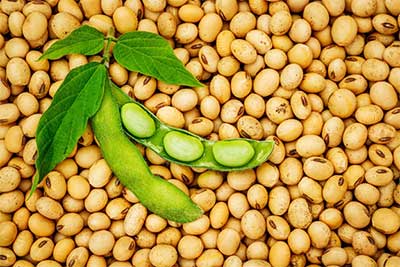Relevance: GS-3: Agricultural produce and issues and related constraints
Key phrases: SEA, Transgenic crop, Genetic Engineering Appraisal Committee (GEAC), Food Safety and Standards Authority of India (FSSAI), Greenpeace, GM crops,Bt cotton, Glyphosate
Why in News ?
- The Solvent Extractors’ Association (SEA) of India has requested the government to exempt soyabean oil from ‘GM’ (genetically modified) labelling requirement.
What are Genetically Modified crops?
- A GM or transgenic crop is a plant that has a novel combination of genetic material obtained through the use of modern biotechnology.
- GM crops can contain a gene(s) that has been artificially inserted instead of the plant acquiring it through pollination.
- Bt cotton is the only GM crop that is allowed in India. It has alien genes from the soil bacterium Bacillus thuringiensis (Bt) that allows the crop to develop a protein toxic to the common pest pink bollworm.
Approval Process for GM crops in India
- The Genetic Engineering Appraisal Committee (GEAC) is the apex body that allows for commercial release of GM crops.
- Use of the unapproved GM variant can attract a jail term of 5 years and fine of Rs. 1 lakh under the Environment Protection Act, 1986.
- Food Safety and Standards Authority of India (FSSAI) is the authorised body to regulate the imported crops in India.
Status of GM Soybean and soyabean seeds in India
- India allows the import of GM soybean and canola oil.
- Import of GM soya bean seeds was so far not approved in India.
Why should the GM tag be removed from Soyabean Oil?
- Soybean oil itself is not a GM food, its origin -- that is soyabean (processed abroad) -- may be a GM food. Once soyabean is crushed and its oil is refined, the oil does not have any traces of GM characteristics in refined soyabean oil. Further, only refined soyabean oil is sold for human consumption.
- The quality parameters set by FSSAI for the domestically produced ( non-GM soyabean) oil and imported soyabean oil (GM seeds) are the same.
- The industry and wholesale trade do not segregate the storage of soyabean oil obtained from domestic source and imported source.
- SEA argued most of the times crude soyabean oil from domestic source and imported source are stored together in the same oil tank.
- FSSAI has not notified the test methodology for determination of GM material in oils and vegetable fats, nor has FSSAI given the test method for GM in its Manual of Methods of Analysis of Foods – Oils and Fats.
- SEA stated that it is not practical for the industry to keep a segregated system; it amounts to large investment for separate storage tanks, pipelines, etc. In spite of that it still will not be a foolproof system.
- Highlighted that the imposition of compulsory labelling of ‘GM’ on soyabean oil produced from GM soyabeans will lead to an artificial premium for soyabean oil produced from non-GM soyabeans leading to inflation.
Arguments against GM crops
- Organisations such as Greenpeace argue that the GM crops don’t yield better results, but push the farmers into debt.
- They lose their sovereign right over seeds as they are forced to buy GM seeds and technologies from multinational corporations.
- The increasing incidence of suicide by farmers cultivating Bt cotton is cited as an example of the perils of GM crops in a country such as India.
- Besides the suspect merits of GM crops, what the opponents also say is that once they are released into the environment, it’s irreversible.
- GM crops can cause long term consequences on human health. Ex: categorisation of glyphosate by the World Health Organization as a “probable carcinogen" used in Bt cotton growth..
Way Forward
- Promoting indigenous gene editing research is important to reduce susceptibility on current GM crops and have good evidence based decision making.
- Clinical trials environment need to be strengthened with robust demonstration of safety and efficacy.
- A two-step model wherein the government works with industry and research groups to accelerate GM based research is recommended.
- Regulatory oversight from bodies like FSSAI should be strengthened to reduce information asymmetry, and there should be scientific segregation of GM vs non-GM crops.
Mains Question:
Q. What is the difference between Genetically Modified crops and Biofortified crops? Despite GM crops' significance in agriculture productivity and climate resilience, the progress made in adoption of GM crops is not very spectacular in India. Explain with reasons. ( 15 marks)
Source: The Hindu BL







